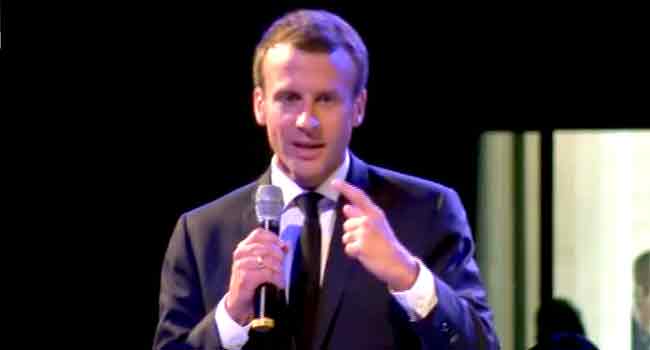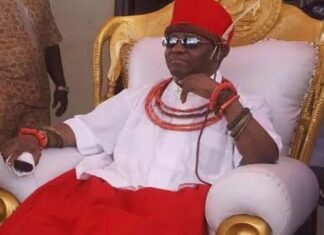By Jeph Ajobaju, Chief Copy Editor
A juicy $2.839 billion is on Africa’s plate from the United Kingdom and France for investment in their former colonial turf, where China is also seeking dominance through economic infrastructure.
The UK pledges £30 million ($39.6 million). But it wants a bigger slice of the extraction of solid minerals on the continent till 2070.
France says it will invest 2.5 billion euros ($2.8 billion). A day after that came to light, it got more than 2 billion euros ($2.26 billion) worth of contracts in Kenya in return.
Global competition
In this new scramble for Africa by competing world powers, America has a permanent military base in Djibouti, along with those of French, Italian.
Djibouti hosts France’s largest foreign military base.
Chinese firms built and partly run a multipurpose port in Djibouti; and are building and will partly run a railway from Djibouti to Ethiopia.

Some Bus Rapid Transit (BRT) routes in Lagos have been concessioned to Chinese firms to build, maintain, and operate with Chinese buses for 25 years.
China is the biggest arms seller to Africa. Russia has 19 military deals with African countries, and Arab states are building bases.
More than 320 embassies were opened in Africa from 2010 to 2016. Turkey alone opened 26. In 2018, India announced it would open 18.
Take by The Economist
The Economist reports that the first great surge of foreign interest in Africa, dubbed the “scramble”, was when 19th-century European colonists carved up the continent and seized Africans’ land.
The second was during the cold war, when East and West vied for the allegiance of newly independent African states; the Soviet Union backed Marxist tyrants while America propped up despots who claimed to believe in capitalism.
A third surge, now under way, is more benign.
Outsiders have noticed that the continent is important and becoming more so, not least because of its growing share of the global population (by 2025 the UN predicts that there will be more Africans than Chinese people).
Governments and businesses from all around the world are rushing to strengthen diplomatic, strategic and commercial ties. This creates vast opportunities.
If Africa handles the new scramble wisely, the main winners will be Africans themselves.
The extent of foreign engagement is unprecedented. Start with diplomacy.
From 2010 to 2016 more than 320 embassies were opened in Africa, probably the biggest embassy-building boom anywhere, ever.
America and France are lending muscle and technology to the struggle against jihadism in the Sahel.
China is now the biggest arms seller to sub-Saharan Africa and has defence-technology ties with 45 countries.
Russia has signed 19 military deals with African states since 2014. Oil-rich Arab states are building bases on the Horn of Africa and hiring African mercenaries.
Military bases in Djibouti
The Economist adds that Graham greene, chronicler of hazy entrepots, would have loved Djibouti. A third of global shipping steams by this little bit of north-east Africa.
All the world, it seems, is crammed together in its capital.
French, Italian and Japanese military bases jostle each other near the shore.
Camp Lemonnier, formerly run by the French Foreign Legion and now America’s only permanent military base in Africa, sits by the airport; China’s first such base is a little to the north-west of it.
Indian and British embassies will soon open.
Soon the Turkiye Diyanet Foundation will open the largest mosque in east Africa in the city; the muezzin will struggle to be heard amid the roar of fighter jets overhead.
From the top of the minaret you can see China—not because it rises all the way to orbit, but because there is a lot of China to see right in front of you.
Djibouti is small, but it boasts a multipurpose port, a railway to Ethiopia and the beginnings of a free-trade zone which, once finished, will be the largest in Africa.
They were all built by Chinese state-owned firms and are at least partly run by them.
On a recent visit to the port, the correspondent of The Economist waved at the sailors on a Chinese naval vessel one berth along from a freighter filled with Ukrainian grain; their returning looks prompted the question of what is Mandarin for disdain.
France pledges $2.8b, gets $2.26b
French companies on March 14 signed contracts in Nairobi worth more than 2 billion euros ($2.26 billion), 24 hours after Paris pledged to invest 2.5 billion euros ($2.8 billion) across the African continent.
French President Emmanuel Macron had on March 13 pledged to invest 2.5 billion euros in Africa by financing and supporting startups and small- to medium-sized enterprises by 2022.
Up to 1 billion euros is earmarked for equity investment in startups and SMEs.
Paris will support about 10,000 enterprises across the continent by providing credit, technical support, and equity financing.
The packages emerged during Macron’s visit to Africa between March 12 and 14 to boost trade with Ethiopia, Djibouti, and Kenya.
France in quest for deeper ties
France – former colonial master of large swathes of Africa – wants to deepen economic ties with Anglophone East Africa.
Macron’s visit to Nairobi was the first by a French president since Kenya won independence from Britain in 1963 and followed stopovers in Ethiopia and Djibouti.
China has moved in aggressively to the three countries and presents stiff competition.
Kenya is East Africa’s most advanced economy with a liberal business environment and entrepreneurial culture. French businesses however account for just a 1.4 per cent market share.
French exports to Kenya in 2017 amounted to between $170 million and $225.80 million. China, Kenya’s number one trading partner, exported goods worth $3.8 billion.
France also faces competition from other European allies, including Britain which is seeking to revive its trade relationship with its former colony as it prepares to leave the European Union (EU).
Past French presidents have arrived in office promising to move France’s African policy beyond its focus on propping up former colonies. Each one has gotten dragged back in.
Macron’s three-day trip to Africa was meant to boost trade with Ethiopia and Kenya, two countries that were never controlled by France.
Still, the trip took place against a backdrop of deepening French military involvement across West Africa, where France has been battling militants since 2013, and recent airstrikes in Chad to support President Idriss Deby.
UK’s £30m investment
British Minister of State for Africa, Harriett Baldwin, said the £30 million is to shore up UK’s investment across Africa.
“From our support to observers ensuring free and fair elections in Nigeria and Senegal … to the crucial training our Armed Forces provides to security forces in Kenya, the UK’s partnership with African countries continues to help empower and upskill people across the continent, and this funding will allow us to boost those efforts.
“Our new partnership will also cement our relationship with the African Union, building on growing economic ties to forge new opportunities for young people and reinforce our close bonds,” Baldwin said.
The partnership will strengthen cooperation on security and prosperity, and support a joined up approach to tackle climate change.
The funding, which forms part of the partnership agreement, and will be spread over three years, will be used to train peacekeepers in Kenya, assist free and fair elections, and support the next phase of negotiations for the African Continental Free Trade Area.
The partnership also allows the UK to support African-led ambitions with British expertise, to create more opportunities and more jobs.
In August 2018, British Prime Minister Theresa May visited Nigeria, Kenya and South Africa to set out her vision for partnership with Africa and the UK’s aim to be the largest G7 investor in Africa by 2022.
The UK is rapidly expanding the diplomatic network of its Foreign and Commonwealth Office in Africa.
It plans to open new embassies in Djibouti, Chad, Niger, Eswatini and Lesotho, and recruit more diplomats with new skills-sets, including in trade and investment.
UK wants bigger slice of Africa’s mining
Besides, the UK, which has 150 years of mining heritage, wants to use its corporate governance expertise to help Africa’s mining sector propel the continent’s economic growth up to year 2170.
In February, the UK’s Department for International Trade (DIT) hosted a panel discussion in Cape Town, South Africa, where visitors dialogued with key figures in mining, agriculture, finance, and government.
The discussion included how British corporate governance experts can help manage stakeholder relations and provide effective communication of what a mine will deliver at the local, regional, and national level.
The panellists also spoke on how the UK is using over 150 years of mining heritage to secure sustainable economic development in Africa for the next 150 years and beyond.
They reiterated the importance of forging a holistic, responsible approach to mining; delivering mutual stakeholder value with focus on sustainable mining ecosystems which serve both business and communities.
The discussion was illustrated by a project in Guinea highlighting how this type of approach could foster wider, sustainable infrastructure development.
British Deputy Trade Commissioner for Africa, Martin Kent, pitched that the panel reinforced the UK’s leading position as Africa’s responsible mining partner of choice.
















